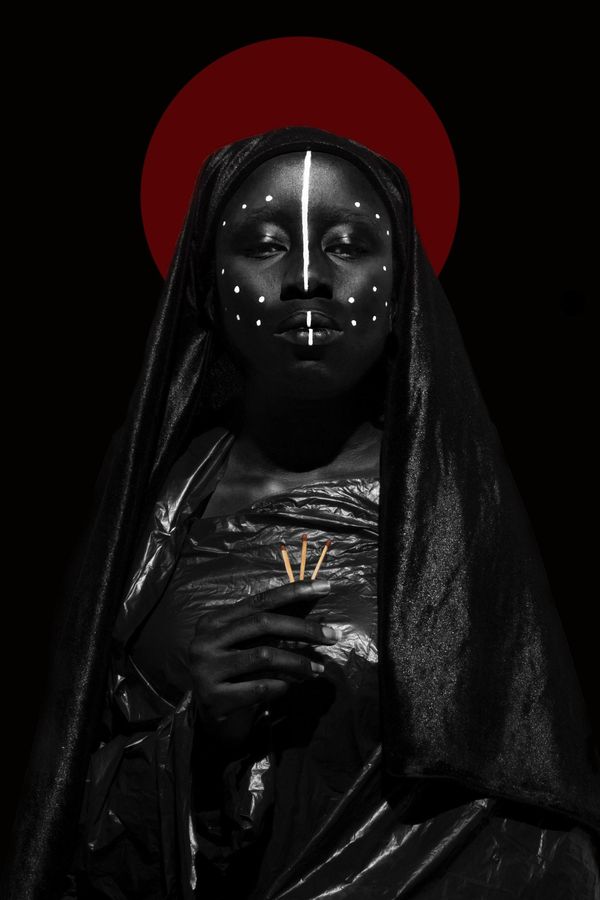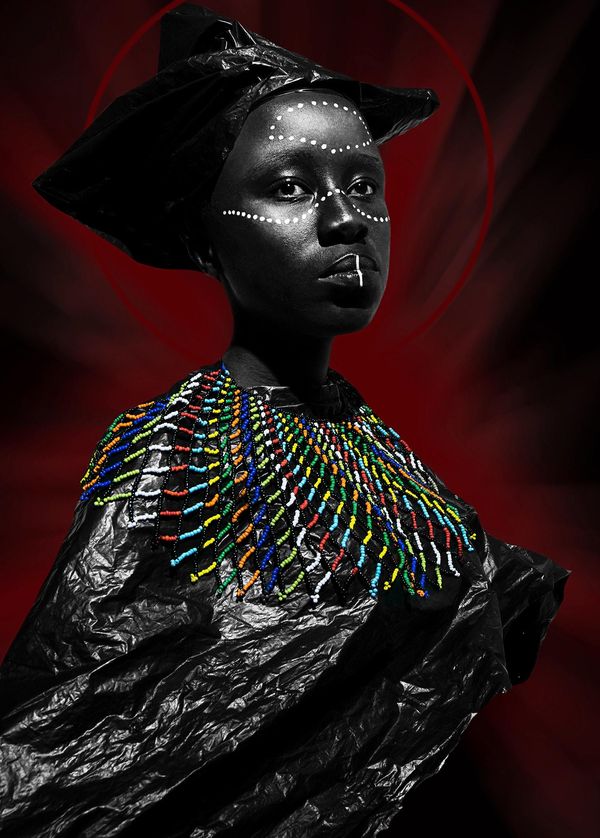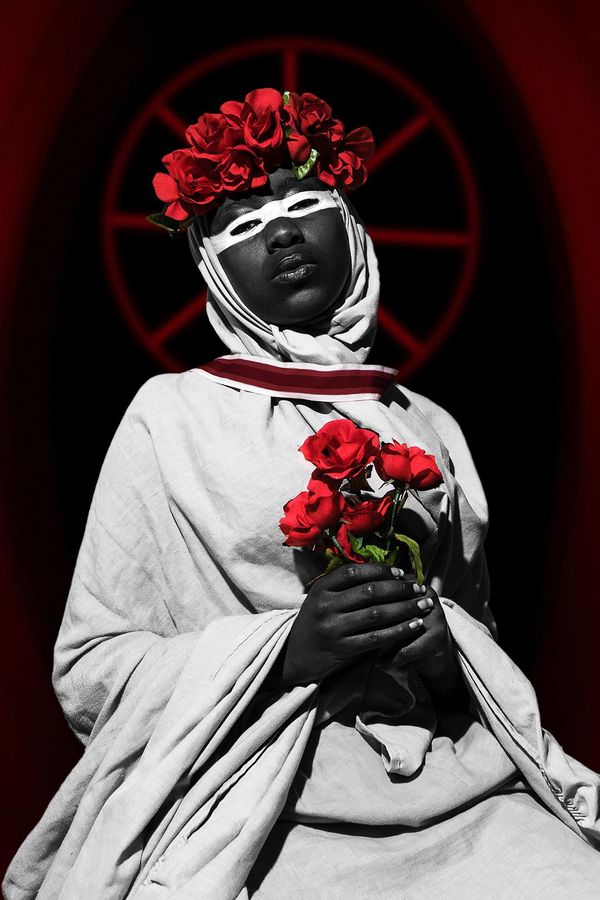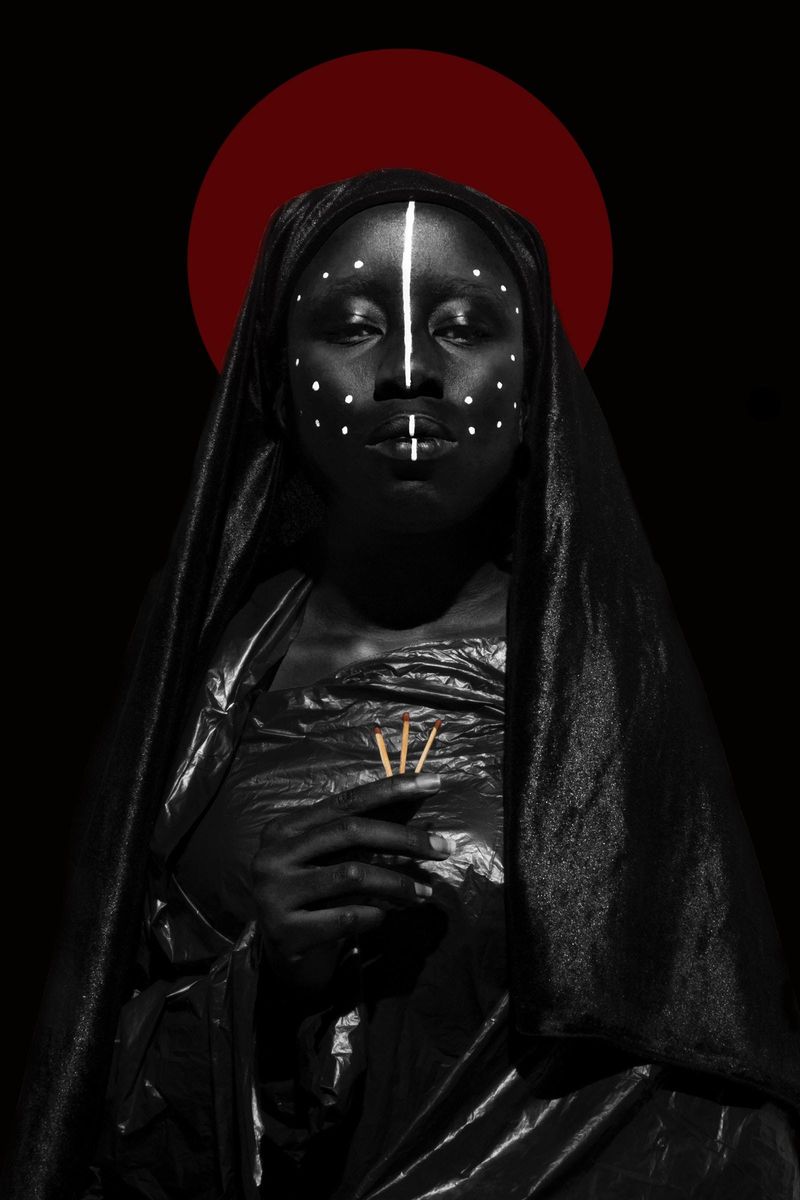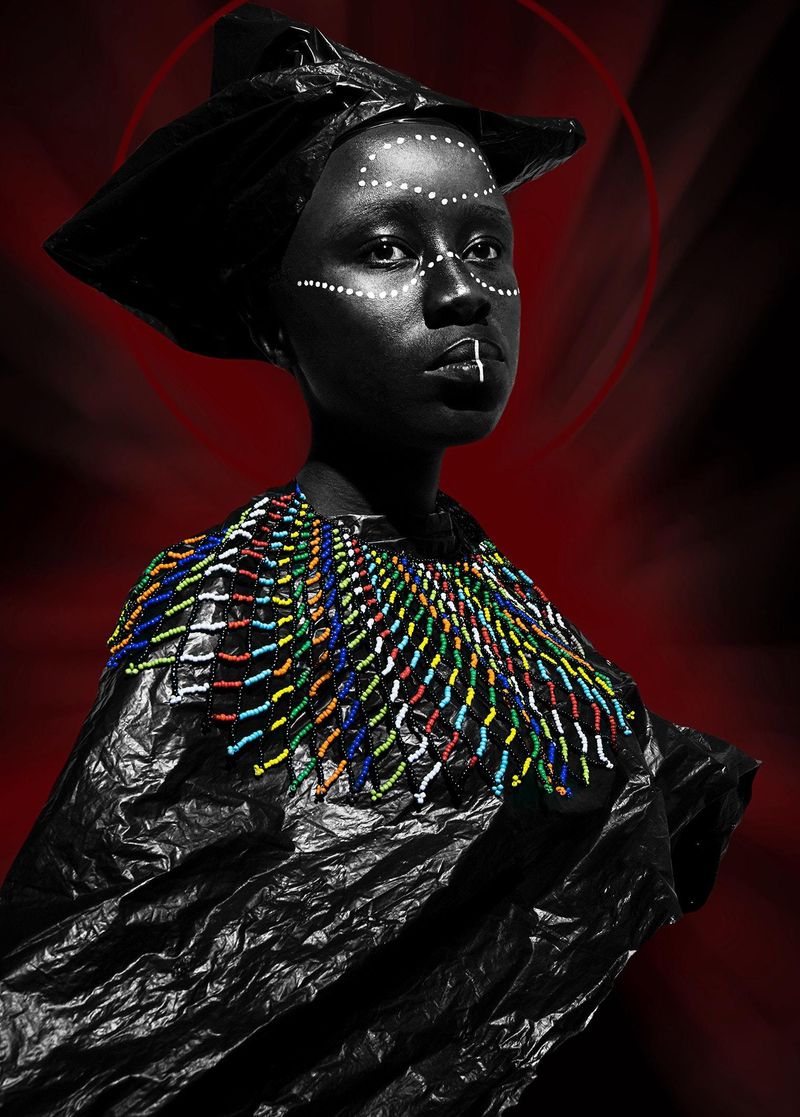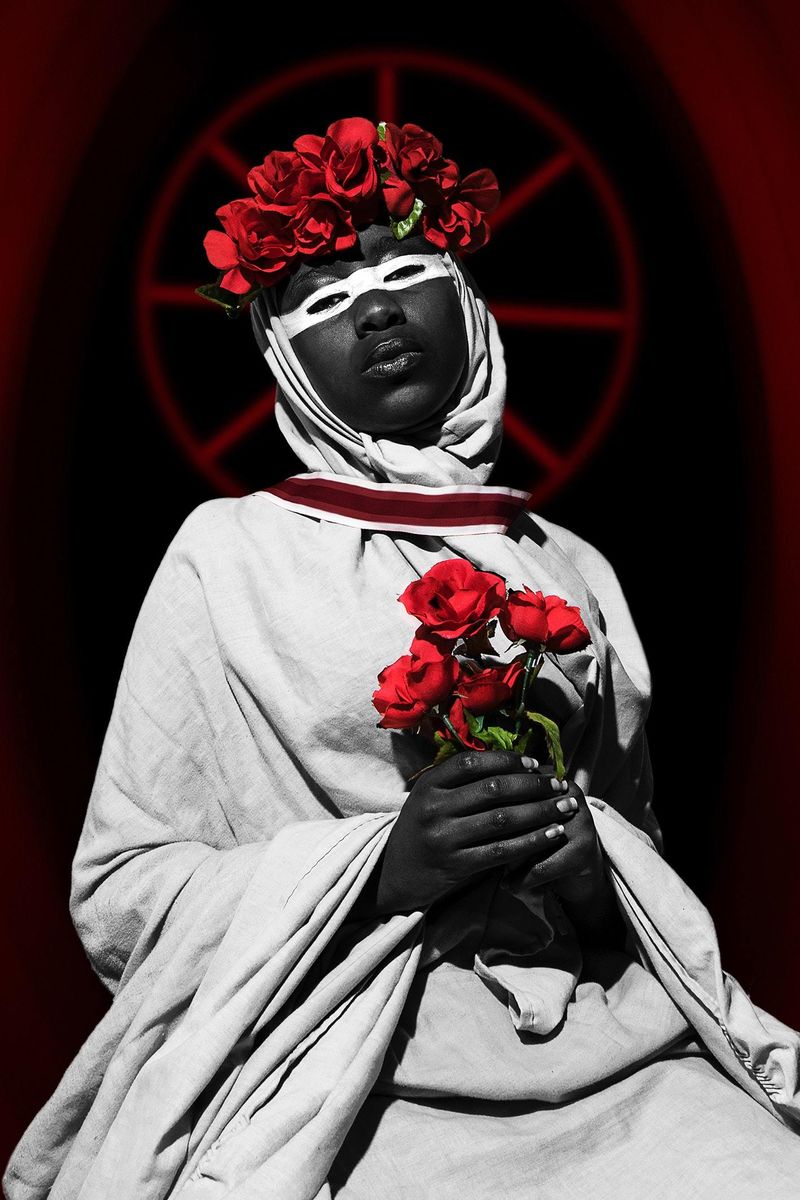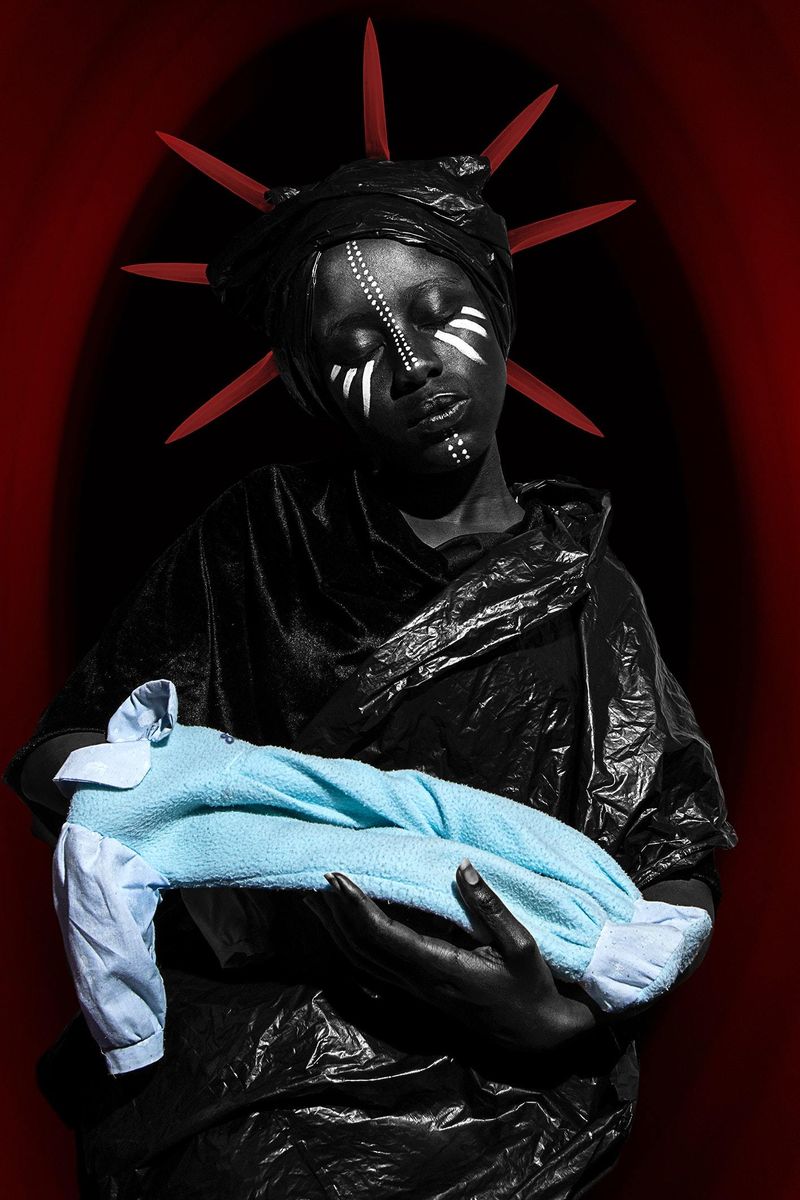The Unforgotten Victims of Femicide
-
Published12 Apr 2019
-
Author
In her work, It Is Well: An Ode To Karabo, South African photographer Lebo Thoka poses for a series of self-portraits that look to honour the life of women who have been sacrificed on the altar of patriarchy.
In her work, It Is Well: An Ode To Karabo, South African photographer Lebo Thoka poses for a series of self-portraits that look to honour the life of women who have been sacrificed on the altar of patriarchy.
In an image paying homage to the memory of Karabo Mokoena, the young South-African girl holds three matches in the fingers of her right hand, fanning out as a sort of trinity, her fierce gaze both blessing and admonishing. Her wrinkled dress, a shining black garbage bag, calls to mind how her ex-boyfriend disposed of her beaten corpse in a dumpsite, after stabbing her 27 times, and setting her body on fire.
Reeva Steenkamp - her eyes just two slits in a blindfold - wears a radiant crown of red roses, bright as the ones she holds in a bouquet. In the story of this South African model, it was Valentine’s Day when her boyfriend killed her, in the middle of the night, gunshots through a bathroom door.
These stories, like many others of domestic and gender-based violence in everyday South Africa, have made headlines and continue to do so. But, as photographer Lebo Thoka ponders in "It Is Well" : An Ode To Karabo, the tale of violated bodies quickly becomes a spectacle of entertainment, bouncing among mainstream media from radio stations to TV commentaries, becoming a mere clickbait to attract audiences.
Rape and corrective rape of women and non-binary people is an endemic issue in the country; the horrific episodes that have been in the news in recent years - the Pistorius’ trial, the accusations against former president Jacob Zuma, Karabo Mokoena’s murder, along with the other cases represented in Thoka's work - are just a fraction of the total.
Despite the lack of comprehensive stats on the number of cases, mostly under-reported due to the absence of external witnesses, the levels of aggression toward women in the country keeps increasing. According to The Huffington Post, South Africa's femicide rate is five times higher than the global rate. But public awareness is increasing too.
Last summer, in concomitance with Women's Month and National Women's Day, thousands of women took to the streets marching under the slogan #TotalShutdown to advocate for women and girls. A few months later, the first National Summit against Gender-based Violence and Femicide was organised, signalling increased awareness toward the issue. Thoka’s work represents a significant contribution too.
Fusing together the languages of photography, art and representation, Thoka subverts the media’s narrative of exploitation; she sounds a powerful, accusatory cry against a systemic patriarchy whose crimes still go unpunished. Capitalising on the legacies of colonialism and apartheid, patriarchate has bred a toxic masculinity, unquestioning of its own responsibilities or the social consequences of its actions.
Thoka inverts the terms of the public narrative, without allowing the exploitation of women and non-binary people’s death to be perpetuated and reiterated. She poses in front of the lens, creating a series of self-portraits, transfiguring herself into each of the victims, because “this could happen to me and to any other women that I know or that I don't know.”
Her subjects are royal, dignified, spurred by a righteous, personal anger that’s born out of the love she nurtures for women: "I'm going to portray women how I view them," she says, "as these entities, these intangible beings, that I believe we are.” Tapping into her religious upbringing, she depicts her women as gods, holy creatures.
Her approach hinges upon a conceptual re-imagining. “I didn't want [that] these women were viewed purely just [for the way] they were murdered, but [also for] the lives they lived. To their family and to their friends they had a whole life, they were whole people. But to the media and to the greater audience they're just how they were murdered, and to me a woman should not be defined by what violence a man has displaced [on] her.”
Ultimately, Thoka’s approach, her choice of self-portraiture as a representation of a broader self, speaks of her commitment to an issue she feels is so close, personal and common to South African women: “In creating art, I feel the greater the risk you take the more you can amplify your voice,” she says. Hopefully, her work will help amplifying the voices of the many women who’ve been silenced for far too long.
--------------
Lebo Thoka is a Johannesburg-based photographer and visual artist. She identifies as a feminist and that directly informs the themes she incorporates within her photographic work. Follow her on PHmuseum and Instagram.
Lucia De Stefani is a multimedia reporter focusing on photography, illustration, culture, and everything teens. She lives between New York and Italy. Find her on Twitter and Instagram.
--------------
This article is part of the series New Generation, a monthly column written by Lucia De Stefani, focusing on the most interesting emerging talents in our community.
